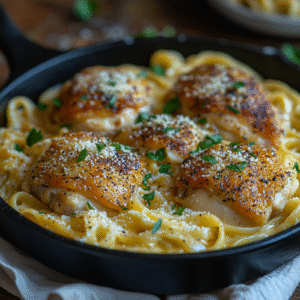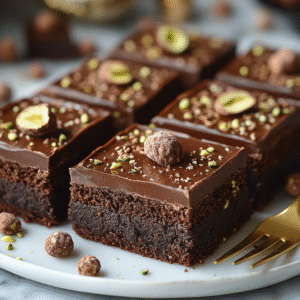Looking for a cozy, wholesome breakfast that’s both satisfying and simple to make? This baked oatmeal recipe is your new go-to morning favorite. Whether you’re meal-prepping for the week or craving something hearty and healthy, baked oats are incredibly versatile, packed with nutrients, and perfect for every lifestyle—including vegan, gluten-free, and high-protein diets.
In this complete guide, we’ll break down exactly what baked oatmeal is, why it’s great for you, how to make it (plus flavor variations), and answer top questions like “Are baked oats actually healthy?” or “Can I cook oatmeal in the oven?” From sweet classics to savory surprises, this article covers it all.
Looking for inspiration? Try our delicious Southern Peach Cobbler if you’re craving more comforting baked breakfast options.
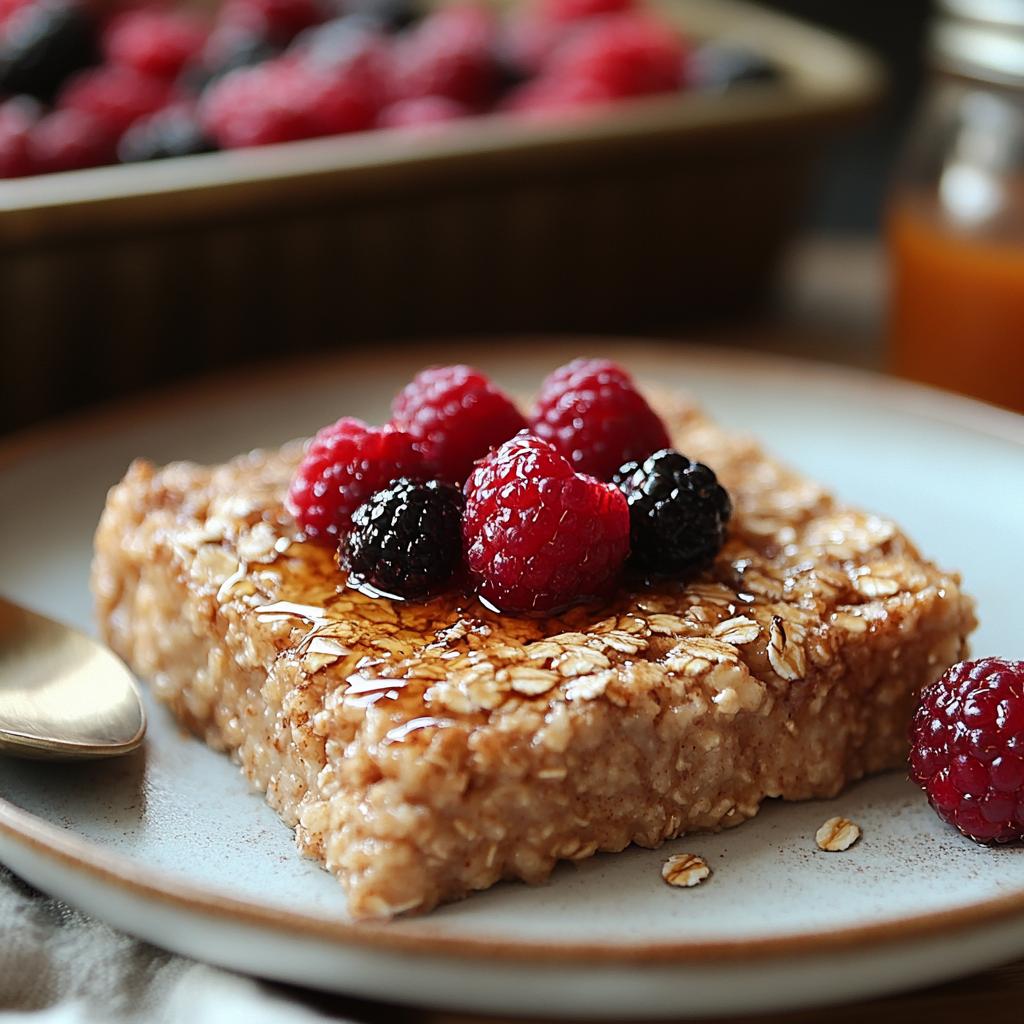
Understanding Baked Oatmeal
What is baked oatmeal and how is it different from regular oats?
Baked oatmeal is a comforting, oven-baked breakfast dish made by mixing rolled oats with milk, eggs, and a touch of sweetness, then baking it until it forms a soft, cake-like texture. Unlike stovetop or instant oats, which have a mushier, porridge-like consistency, baked oatmeal holds its shape. It can be sliced into bars or squares, making it ideal for on-the-go breakfasts or batch meal prepping.
It’s often customized with fruits, nuts, spices, or even chocolate chips, making it one of the most adaptable breakfast recipes around. From a blueberry banana baked oatmeal to a cinnamon apple pie version, there’s a flavor to match every craving.
Nutritional benefits of a baked oatmeal recipe
Oats are one of the healthiest grains you can eat. When baked, they retain their powerful nutritional profile while offering a more appealing, texture-rich eating experience. Here’s what makes a baked oatmeal recipe a smart start to your day:
| Nutrient | Benefit |
|---|---|
| Fiber (especially beta-glucan) | Supports heart health, improves digestion |
| Protein | Keeps you full longer |
| Complex carbs | Sustained energy without spikes |
| B-vitamins | Important for energy metabolism |
| Iron | Supports red blood cell function |
Adding ingredients like fruits, seeds, or nut butters boosts the nutritional content even more—offering healthy fats, antioxidants, and plant-based proteins.
Check out this Snickerdoodle Zucchini Bread for another creative way to add fiber-rich veggies and oats to your morning!
Up next, we’ll dive into why baked oatmeal isn’t just tasty—it’s also one of the healthiest ways to start your morning.
Why Baked Oatmeal is a Healthy Breakfast Choice
Are baked oats actually healthy? (Addressing health claims)
Yes—baked oats are more than just trendy. They’re legitimately one of the healthiest breakfasts you can make, especially when you skip excess sugar and use whole, natural ingredients. Oats on their own are rich in soluble fiber, particularly beta-glucan, which has been shown to help reduce LDL cholesterol, balance blood sugar levels, and promote gut health.
Unlike boxed cereals or sweet breakfast pastries, a baked oatmeal recipe gives you slow-digesting carbs, essential vitamins, and filling fiber in one satisfying dish. When you bake them instead of boiling or microwaving, you’re also able to mix in whole fruits, seeds, milk alternatives, and natural sweeteners—enhancing the nutritional value without loading on unhealthy fats or additives.
Fiber, protein, and low-GI benefits in oatmeal
Let’s break down some of the core reasons baked oatmeal is such a balanced meal choice:
| Component | Why It Matters |
|---|---|
| Fiber | Keeps digestion smooth, helps control hunger, and supports heart health |
| Protein | Adds satiety and helps build/repair muscles—especially when paired with eggs, Greek yogurt, or protein powder |
| Low Glycemic Index | Baked oats release energy slowly, helping to prevent sugar crashes and mid-morning hunger pangs |
You can boost your baked oats even more by adding chia seeds, almond butter, hemp seeds, or flaxseed—all of which elevate protein, omega-3s, and antioxidants without making it heavy.
For a real breakfast treat with benefits, don’t miss our Strawberry Cream Cheese Glaze Pound Cake —a fun way to enjoy oats and fruit flavors in dessert form.
Coming up next, we’ll explore the essential ingredients that make every baked oatmeal recipe a hit.
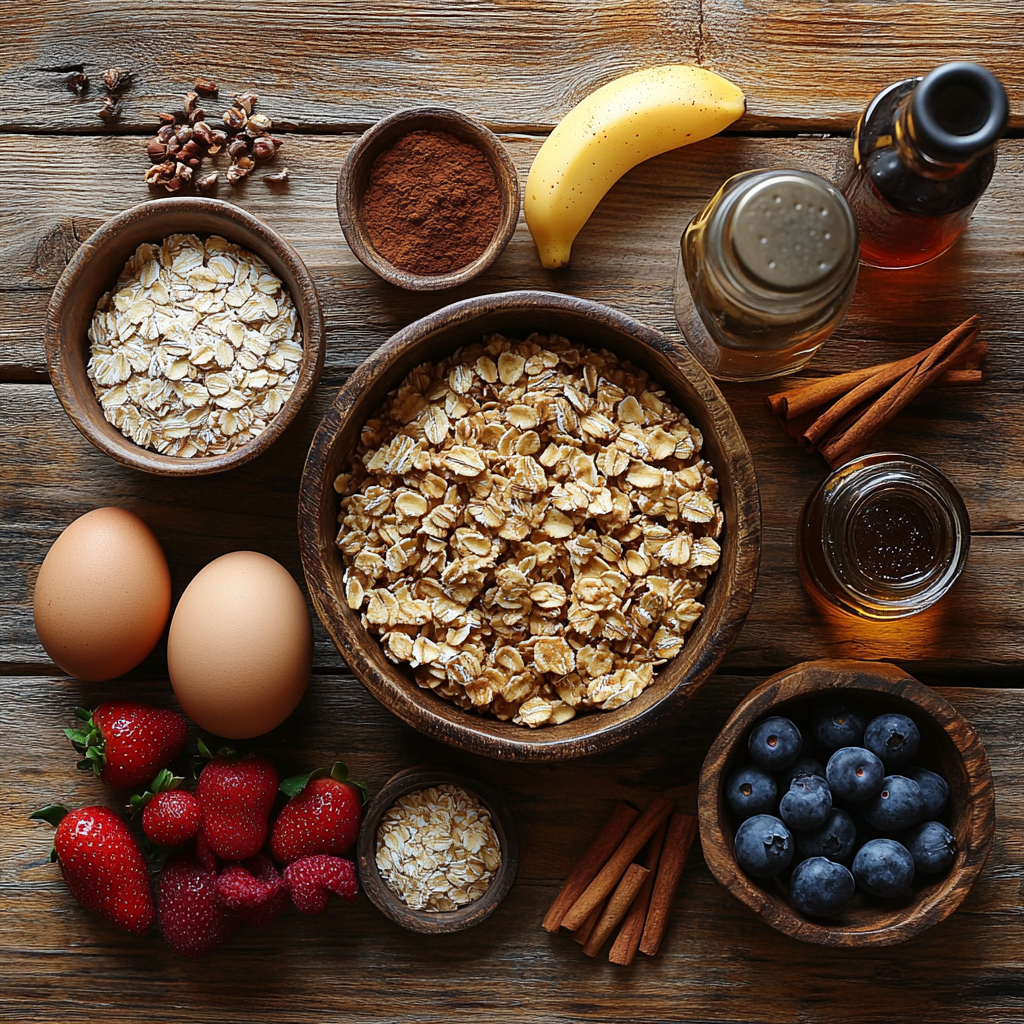
Basic Ingredients for the Perfect Baked Oatmeal Recipe
Must-have ingredients for classic baked oatmeal
At the heart of every great baked oatmeal recipe are just a few simple pantry staples. These core ingredients provide the ideal texture, structure, and flavor foundation to build upon:
| Ingredient | Purpose |
|---|---|
| Old-fashioned rolled oats | The base—chewy, hearty, and hold shape well |
| Milk (or milk alternative) | Adds moisture and creaminess |
| Eggs | Help bind ingredients and create structure |
| Sweetener | Brown sugar, maple syrup, honey, or coconut sugar to add depth |
| Baking powder | Helps oatmeal rise slightly and prevents heaviness |
| Spices | Cinnamon, nutmeg, vanilla extract for warmth and aroma |
| Add-ins | Fruits (bananas, berries), nuts, chocolate chips, seeds, etc. |
These ingredients can be mixed in one bowl, poured into a baking dish, and baked for about 30–35 minutes. It’s really that simple!
Want to go bolder? Add nut butters, yogurt, or even protein powder to suit your dietary goals. Baked oats adapt easily to your cravings or needs.
Healthy substitutes for common allergens (gluten-free, dairy-free options)
Many people ask: Can I make baked oatmeal gluten-free or dairy-free? Absolutely! Oats are naturally gluten-free, but cross-contamination during processing can be a concern. Always choose certified gluten-free oats if you’re celiac or sensitive.
Here are easy substitutions:
| Ingredient to Replace | Try This Instead |
|---|---|
| Milk | Almond milk, oat milk, soy milk, coconut milk |
| Eggs | Chia or flax eggs (1 tbsp seeds + 3 tbsp water = 1 egg) |
| Butter | Coconut oil, applesauce, vegan butter |
| Sweetener | Maple syrup, agave, stevia, date syrup |
These swaps ensure your baked oatmeal remains moist, flavorful, and packed with nutrients—without the allergens.
Discover great ideas like our Snickerdoodle Zucchini Bread that also use allergen-friendly swaps without losing flavor or texture.
How to Make Baked Oats – Step-by-Step
How to make baked oats at home with simple tools
You don’t need a fancy kitchen to make the perfect baked oatmeal recipe. In fact, all you need are basic tools and a few minutes to mix your ingredients. Here’s a simple step-by-step process anyone can follow:
Basic Baked Oatmeal Recipe (1 Pan, 6 Servings)
Ingredients:
- 2 cups old-fashioned rolled oats
- 1 ¾ cups milk (or dairy-free alternative)
- 2 eggs (or flax eggs for vegan)
- ¼ cup maple syrup or brown sugar
- 1 tsp baking powder
- 1 tsp vanilla extract
- 1 tsp cinnamon
- Pinch of salt
- Optional: 1 mashed banana or ½ cup berries
Instructions:
- Preheat your oven to 350°F (175°C) and lightly grease an 8×8 baking dish.
- In a large bowl, whisk together milk, eggs, sweetener, and vanilla.
- Stir in the oats, baking powder, cinnamon, salt, and any fruit or add-ins.
- Pour the mixture into the prepared baking dish.
- Bake for 30–35 minutes, or until the center is set and the top is golden brown.
- Let cool slightly before slicing. Serve warm or refrigerate for later!
That’s it—simple, wholesome, and perfect for make-ahead meals.
Common mistakes to avoid when baking oatmeal
Even with a straightforward baked oatmeal recipe, there are a few common mistakes that can lead to disappointing results. Here’s what to watch out for:
| Mistake | Why It Matters | Fix It With… |
|---|---|---|
| Using instant oats | Too soft, mushy texture | Stick to old-fashioned rolled oats |
| Skipping the binder (eggs/flax eggs) | Oatmeal falls apart | Always use a binding ingredient |
| Overbaking | Dries out the oats | Check at 30 mins and don’t overbake |
| Too much liquid | Turns soggy, not set | Use correct ratio: 2 cups oats to 1.75 cups milk |
| Not seasoning | Bland taste | Add cinnamon, vanilla, or nutmeg |
Want a more decadent twist? You can also blend the ingredients before baking for a more cake-like texture, often called “blended baked oats.”
Don’t miss our comforting Southern Peach Cobbler for another warm and fruity oven-baked treat.
Sweet and Savory Variations to Try
One of the best things about a baked oatmeal recipe is how versatile it is. Whether you’ve got a sweet tooth or prefer something hearty and savory, there’s a version that fits your taste. Let’s explore some popular flavor combinations that can easily be baked right into your oats.
Top sweet baked oatmeal flavor combos (banana, blueberry, chocolate chip)
Sweet variations are the go-to for most people—and for good reason. They’re naturally satisfying, easy to prep, and often feel like dessert for breakfast without the guilt. Here are a few favorites to try:
1. Banana Bread Baked Oatmeal
- 2 ripe bananas, mashed
- Add chopped walnuts or pecans
- Sprinkle cinnamon and nutmeg
- Optionally sweeten with maple syrup
2. Blueberry Lemon Zest
- 1 cup fresh or frozen blueberries
- Zest from 1 lemon
- Stir in a few tablespoons of Greek yogurt for tang
3. Chocolate Peanut Butter
- 2 tablespoons cocoa powder in the oat mixture
- Swirl in natural peanut butter before baking
- Top with dark chocolate chips
4. Apple Cinnamon Crunch
- 1 diced apple
- 1 tsp cinnamon + dash of nutmeg
- Top with crushed granola or chopped almonds before baking
5. Pumpkin Pie Spice
- ½ cup pumpkin puree
- Pumpkin pie spice mix
- Sweeten with honey or agave
You can prep any of these ahead and store in the fridge or freezer for a grab-and-go breakfast that never gets boring.
Delicious savory baked oatmeal recipes (cheddar, spinach, eggs)
Not a fan of sweets in the morning? Baked oats go savory, too—and they’re just as filling and flavorful. These options work great for brunch or even dinner:
1. Cheddar & Herb Baked Oats
- Shredded sharp cheddar
- Fresh thyme or rosemary
- Add cooked bacon or turkey sausage for a protein boost
2. Spinach & Feta
- Wilted spinach
- Crumbled feta cheese
- Cherry tomatoes for a fresh twist
3. Veggie & Egg Bake
- Sauteed bell peppers, onions, and zucchini
- 2 extra eggs for more firmness
- Top with salsa or avocado after baking
Savory baked oatmeal is also perfect for low-sugar or low-GI diets since it skips added sweeteners and focuses on fiber-rich, protein-packed ingredients.
Check out our Strawberry Cream Cheese Glaze Pound Cake for inspiration on balancing sweet and rich ingredients in your baking.
Oven vs Stove – Can I Cook Oatmeal in the Oven?
When people think of oatmeal, they often picture a bubbling pot on the stovetop. But cooking oatmeal in the oven? That’s a game changer. Let’s break down why—and how—baking your oats delivers better flavor, texture, and convenience.
Baking vs stovetop oatmeal: pros and cons
There’s nothing wrong with a hot bowl of stovetop oatmeal. It’s fast, simple, and classic. But baked oatmeal offers a different experience entirely.
| Feature | Stovetop Oats | Baked Oatmeal |
|---|---|---|
| Texture | Creamy, soft, porridge-like | Cake-like, chewy, sliceable |
| Prep Method | Must be stirred constantly | Mix and bake—hands-off |
| Batch-Friendly | Not ideal for prepping many servings | Great for feeding families or weekly prep |
| Flavor Infusion | Ingredients added after cooking | Bakes flavors into each bite |
| Storage | Doesn’t store well—gets soggy | Keeps well in fridge/freezer for days |
Baking oatmeal also gives you more freedom to prep ahead and bake once—no babysitting a pot or worrying about burning the bottom.
How oven-cooked oats differ in taste and texture
The oven transforms oats into a more structured, satisfying dish. It crisps the top slightly while keeping the inside moist and tender—much like a muffin or bread pudding. The edges caramelize slightly, giving you a richer flavor that stovetop oats just can’t match.
If you like a toasty, hearty, and slightly sweet breakfast, oven-baked oatmeal is for you.
Still not sure? Here’s an idea: prep your baked oats the night before and pop them into the oven first thing in the morning. You’ll wake up to the smell of warm cinnamon, vanilla, and fruit. No stirring. No mess. Just delicious.
Can Oatmeal Be Used in Other Baking Recipes?
Absolutely! Oatmeal isn’t just a breakfast food—it’s a powerhouse baking ingredient that adds texture, moisture, and nutrients to all kinds of recipes. Whether you’re baking cookies, muffins, or quick breads, oats can take your baked goods to the next level.
Oatmeal in cookies, muffins, and breads
Oats work incredibly well in both sweet and savory bakes. Here’s how to use them across different baked goods:
Oatmeal Cookies
- Rolled oats add chewiness and heartiness to classic cookie dough.
- Combine with raisins, chocolate chips, or dried cranberries for variety.
- Oats help reduce the amount of flour needed, making cookies more fiber-rich.
Muffins and Cupcakes
- Fold oats into muffin batter to increase texture and satiety.
- Soaking oats in milk before mixing helps keep muffins moist.
- Great with bananas, apples, blueberries, or pumpkin puree.
Quick Breads (like banana or zucchini bread)
- Oats add bulk and stability to soft, moist breads.
- You can swap out part of the flour for oats or oat flour for a denser texture.
- Adds a nutty flavor and improved nutrition without overpowering taste.
Looking for inspiration? Try our Snickerdoodle Zucchini Bread—a great example of oats used creatively in non-breakfast baking.
How to grind oats into flour for baking versatility
If you want a smoother texture in your baked goods but still want the health perks of oats, grind them into oat flour. It’s simple and budget-friendly:
How to Make Oat Flour:
- Add 1–2 cups of rolled oats to a blender or food processor.
- Pulse until the texture is fine and powdery—like traditional flour.
- Store in an airtight container for up to 2 months.
Oat flour is naturally gluten-free (just ensure your oats are certified gluten-free) and perfect for:
- Pancakes
- Muffins
- Gluten-free cookies
- Energy bites
- Even crusts for pies or tarts
It can replace 25–30% of all-purpose flour in most recipes to improve nutrition and add a rich, hearty depth.
Storage and Meal Prep Tips for Baked Oatmeal
One of the biggest benefits of a baked oatmeal recipe is how easy it is to prep ahead. Whether you’re feeding a crowd or just want to simplify your mornings, baked oats are a storage-friendly breakfast that stays delicious for days.
How to store baked oats in the fridge or freezer
Once your oatmeal is baked and cooled, it’s ready to store. Here’s how to keep it fresh and flavorful:
Fridge Storage (up to 5 days):
- Slice baked oatmeal into portions.
- Place in an airtight container or wrap individually with plastic wrap.
- Store in the refrigerator and reheat in the microwave for 30–60 seconds when ready to eat.
Freezer Storage (up to 3 months):
- Allow baked oats to cool completely.
- Cut into individual servings and wrap tightly in foil or plastic wrap.
- Place wrapped pieces in a zip-top freezer bag with the date labeled.
- Reheat from frozen in the microwave or oven.
| Storage Method | Shelf Life | Reheat Tips |
|---|---|---|
| Fridge | 4–5 days | Microwave or warm in oven (350°F for 10 mins) |
| Freezer | 2–3 months | Thaw overnight or microwave from frozen |
Don’t miss our Southern Peach Cobbler for another freezer-friendly comfort dish that’s just as satisfying after a few weeks in cold storage.
Print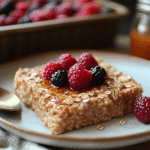
Baked Oatmeal Recipe: The Ultimate Guide to a Healthy, Easy, and Delicious Breakfast
- Total Time: 45 minutes
- Yield: 6 servings 1x
Description
A cozy, wholesome breakfast that’s hearty, healthy, and perfect for meal prep—this baked oatmeal recipe is simple to make and packed with fiber, protein, and flavor.
Ingredients
- 2 cups old-fashioned rolled oats
- 1 ¾ cups milk (or dairy-free alternative)
- 2 eggs (or flax eggs for vegan)
- ¼ cup maple syrup or brown sugar
- 1 tsp baking powder
- 1 tsp vanilla extract
- 1 tsp cinnamon
- Pinch of salt
- Optional: 1 mashed banana or ½ cup berries
Instructions
- Preheat your oven to 350°F (175°C) and lightly grease an 8×8 baking dish.
- In a large bowl, whisk together milk, eggs, sweetener, and vanilla.
- Stir in the oats, baking powder, cinnamon, salt, and any fruit or add-ins.
- Pour the mixture into the prepared baking dish.
- Bake for 30–35 minutes, or until the center is set and the top is golden brown.
- Let cool slightly before slicing. Serve warm or refrigerate for later.
Notes
Customize with your favorite fruits, spices, or add-ins. For a vegan version, use flax eggs and plant-based milk. Perfect for meal prep or grab-and-go breakfasts!
- Prep Time: 10 minutes
- Cook Time: 35 minutes
- Category: Breakfast
- Method: Baking
- Cuisine: American
Keywords: baked oatmeal, healthy breakfast, oats, gluten-free, meal prep, vegan options
Best ways to meal prep baked oatmeal for the week
Here’s how to make mornings stress-free and delicious:
- Bake in advance on Sunday and portion into single servings for each weekday.
- Use muffin tins to create individual baked oatmeal cups that are perfectly portable.
- Try multiple flavors in one batch by dividing your base batter and adding different toppings to each portion before baking.
Example Meal Prep Flavor Combos:
- Blueberry Lemon
- Chocolate Banana
- Apple Cinnamon
- Savory Spinach & Feta
Having a variety of baked oatmeal servings in your fridge or freezer lets you mix up flavors without adding time to your routine.
Baked Oatmeal for Special Diets and Lifestyles
Baked oatmeal is one of the most adaptable recipes around. Whether you’re vegan, keto, gluten-sensitive, or just watching your sugar, there’s a baked oatmeal variation that fits your lifestyle. Let’s look at how to customize your recipe for different dietary needs without sacrificing flavor.
Vegan baked oatmeal recipe adaptations
To make a baked oatmeal recipe completely plant-based, all you need are a few simple swaps:
| Traditional Ingredient | Vegan Alternative |
|---|---|
| Eggs | Flax eggs (1 tbsp flaxseed + 3 tbsp water) |
| Milk | Almond, soy, or oat milk |
| Honey | Maple syrup or agave |
Here’s a simple Vegan Banana Baked Oatmeal idea:
- 2 ripe bananas
- 2 cups rolled oats
- 1¾ cups almond milk
- 1 flax egg
- 1 tsp vanilla, ½ tsp cinnamon
- Bake at 350°F for 30–35 mins
This recipe is naturally sweet, hearty, and dairy-free—perfect for a plant-based lifestyle.
Low sugar, keto-friendly, and high-protein options
While oats aren’t keto in the strictest sense, you can still enjoy low-sugar or protein-packed baked oatmeal that aligns with low-carb or fitness goals.
Low-Sugar Options:
- Skip added sugar and use mashed banana or unsweetened applesauce
- Add vanilla and spices to boost flavor
- Use monk fruit, stevia, or erythritol as a sugar-free sweetener
High-Protein Baked Oats:
- Add 1 scoop of vanilla or chocolate protein powder to the oat mix
- Mix in Greek yogurt or cottage cheese for creaminess and protein
- Include chia seeds, hemp hearts, or nut butters
Keto-Inspired Bake (Oat-Free Alternative):
- Use chia seeds, flaxseed meal, almond flour, and shredded coconut instead of oats
- Mix with eggs, almond milk, and low-carb sweetener
- Bake into bars or muffins
No matter your diet, there’s a version of baked oatmeal that can work for you.
Looking for inspiration? Try our Strawberry Cream Cheese Glaze Pound Cake which can also be made lower-sugar or dairy-free with simple swaps.
FAQ Section
Are baked oats actually healthy?
Yes. Baked oats are high in fiber, slow-digesting carbs, and nutrients like iron and B vitamins. They’re also easy to customize with low sugar, high protein, and allergy-friendly ingredients.
Can I cook oatmeal in the oven?
Definitely. Baking oatmeal gives it a cake-like texture and rich flavor. It’s also great for meal prep—just mix, bake, and slice.
How to make baked oats?
Mix rolled oats, milk, eggs (or substitutes), baking powder, sweetener, and your favorite add-ins. Pour into a dish and bake at 350°F for 30–35 minutes.
Can oatmeal be used in baking?
Yes! Oatmeal works well in cookies, muffins, breads, and even crusts. You can also grind it into oat flour for a gluten-free alternative in baking
For daily recipes you can follow me on Facebook and Pinterest.
